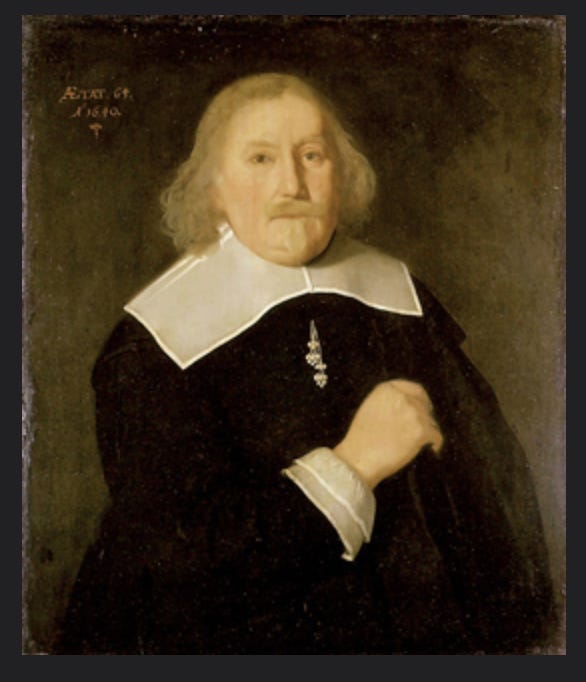Shakespeare in Context: John Lowin
The playwright's colleague
When we think about William Shakespeare, we tend to imagine him in isolation: the great playwright, alone, composing gorgeous verse in his study. In truth, he was a central part of a network of people that extended in many directions.
Shakespeare was the lead playwright of the King’s Men, an acting company which had James I as its patron. As an acting company, it, naturally, had actors on its books. And one of these was John Lowin.
Lowin is interesting not just because he was in the King’s Men, but because he was around for a long time, with a career spanning forty years. His life is typical of the time, analogous to the Burbages, Shakespeare and other men of the theatre. Born (or at least baptised) in 1576, his father was a tanner, and the young Lowin was apprenticed to be a goldsmith.
Perhaps like Shakespeare himself, and certainly like the clown Robert Armin, who did exactly the same thing, Lowin eschewed the glitter of real gold for that of fantasy. The lure of the theatre was strong, and he began to tread the boards, soon ending up in the King’s Men.
We know that he acted in Ben Jonson’s classically-based play, Sejanus, as he is listed among the players; also listed is William Shakespeare (who probably played Tiberius.) Here we have a living link between Lowin and Shakespeare: the two rehearsed together, acted together, and no doubt feasted together afterwards.
He also played in works by Shakespeare himself: he took the role of Falstaff, and is supposed to have played Henry VIII. This, too, is interesting, because he was held to have passed on his ideas about the role to William Davenant (also a playwright and, significantly, Shakespeare’s godson.) In a prologue to one of Davenant’s plays, The Platonic Lovers (1635), Lowin writes that he “laboured here / In buskins and in socks this thirty year.” A true professional Roscius; and yet, thanks to the closing of the theatres by the Puritans, he ended his days in relative poverty as an innkeeper. You can imagine him pouring out jugs of ale, telling his customers about his glory days.
Lowin appeared in some of the greatest plays of the seventeenth century, including John Webster’s The Duchess of Malfi, where he took on the meaty and demanding role of the malcontent Bosola. Massinger, Beaumont and Fletcher, Ben Jonson; there’s barely a playwright whose work Lowin did not bring alive. He seems, in fact, to have specialised in villains, such as Domitian in The Roman Actor. Did he play Iago? It’s certainly tempting to think so.
In the First Folio of Shakespeare’s plays, Lowin is listed amongst the actors. And in the 1647 Beaumont and Fletcher Folio, he is the first actor on the list, showing his great importance:
“But directed by the example of some, who once steered in our qualitie [i.e., John Heminge and Henry Condell], and so fortunately aspired to choose your Honour, joyned with your (now glorified) Brother, Patrons to the flowing compositions of the then expired Sweet Swan of Avon, SHAKESPEARE....”
Here is a man who appeared on stage with William Shakespeare; who played in plays written by William Shakespeare; who knew his godson, Davenant, intimately well; who is mentioned in the First Folio; and who signed the Beaumont and Fletcher Folio, explicitly identifying William Shakespeare as the Sweet Swan of Avon.
His portrait hangs in the Ashmolean Museum. More people should know of him, and this direct, vital link to the life of our greatest playwright.
Philip Womack’s recent novels include Wildlord.



Thanks for this - just writing on Malfi so super to know about Lowin and will go to the Ashmolean and track him down!
Ah, Davenant!